What to expect when you start receiving home care
Home care is a service provided by professionals who visit your home regularly to provide assistance with activities of daily living (ADL). Nurses or personal care assistants provide home care activities such as washing, dressing, grooming, toilet help, feeding, medicines management, and other tasks.
Home Care Services
There are various types of home care services, including personal care, nursing, homemaking, meal preparation, housekeeping, transportation, and companionship.
The type of home care you receive depends on your specific needs.
An assessment by a social care professional; often an occupational therapist or social worker, will help decide on the type of care you need.
Speak to your local council
If you’re having trouble with everyday tasks such as washing, cooking or getting dressed, ask your local council for a care needs assessment. This works out what would help you stay independent at home for longer. With your permission, your family carer, GP, or district nurse can refer you for an assessment on your behalf. If you’re discharged from the hospital, the staff on your ward can arrange the home care assessment.
You will need to contact social services at your local council. Ask for a social care assessment if it hasn’t been provided for you with your hospital discharge.

Care Workers are here to help you
Care teams offer a wide range of bespoke care packages and personal care services to pick from. So you can have a well-designed Home Care plan that will fit your needs, lifestyle, and background.
The duties of a home care worker:
You could receive assistance with everyday tasks like washing and dressing, meal preparation, shopping, housekeeping and gardening. As well as helping you with medication and taking you to your social activities.
They will also make sure that floors are cleared to prevent falls and that bathrooms are hygienic. Personal care may involve helping you bathe, shower, brush your teeth and put on your clothes.
Care workers will also be happy to help you arrange for maintenance work, such as calling a plumber, for example.
However, they will never handle payments/paying bills without your express permission and recording it on your notes. If someone else handles your money, your caregivers will always run any transaction past them.
Depending on the type of care you choose, you may have different people coming and going from your home throughout the day. This can be strange to get used to, but many people enjoy the bustle of a busy household and the regular company. Because you’ll know exactly what times to expect them, you won’t need to worry about privacy.
Each week you will be sent a rota of which care worker is coming and when. A copy may also be sent to a loved one who is involved in your care.

Is Home Care Right for me?
The aim of the care at home scheme is to help vulnerable people live independently and securely in their own homes.
You may not need formal care and support. You may just need support to arrange help with shopping or domestic tasks. This type of support is great for a short period of time, but it can continue for however long you need it.
Home care can provide you with:
- A short-term Home Care Reablement Service.
- Respite Care after leaving the hospital.
- A personal assistant for people with complex needs. Dementia, domiciliary care, palliative care, physical disability, long-term conditions, mental health problems, and end-of-life care are, to name a few.
- An overnight service between the hours of 10.30 pm and 7.30 am.
Choosing your Homecare Agency
f you’re looking for your own homecare in the UK, you have lots of options. There are many different agencies offering home care services, from large companies to small local businesses.
Some of these agencies offer their own staff, while others use independent contractors. Some agencies only offer one type of service, while others can tailor their services to meet your individual requirements.
When choosing which agency to go with, consider:
- What type of service do you need? Do you want a full-time caregiver or would you prefer part-time?
- How much do you want to pay per hour?
- Will you be providing accommodation for your carer?
- Are there particular skills you require? For example, if you have a disability or mobility issues, then you might not be able to drive yourself to appointments. In this case, you might need a driver.
You should also check the official reports made by the CQC (Care Quality Commission). Ask if the care agencies you’re considering are members of the UKHCA (UK Home Care Association).
Home care agencies vetted by the UKHCA are subject to strict, frequent checks. They must attend training to maintain a high standard of care.
Speaking to your Care Provider
After choosing your care agency, they will assign you a care provider to perfectly match you.
You will meet with your care worker to discuss with you your needs and requirements. They will create a care plan tailored to you, with times and days, that work best for you.
Live-in care is a brilliant way for you to stay in your home, and not have to move into residential care. You’ll still receive the high level of care you require.
Some people can have ‘Early Supported Discharge’ (ESD) which allows them to leave the hospital soon after a stroke. You’ll continue to have the medical care and therapy you need to recover in the comfort of your own home.
You will always know who is coming to visit you at any given time. You or your family members will receive an email each week with a list of the names of the care workers who are visiting you. If you wish, you can also send a copy of the list to someone else who is involved in your daily life. Care workers will wear badges or identification cards so that you know they are the right person. They will always ask for your permission first before they enter your home.
Changes to your home
You may find that you have to make some changes to your home to accommodate care visits and home care providers.
If your carer is going to live with you, you should consider their living arrangements. If you have a spare room, you could ask them if they want to move in there.
You might also think about whether you want to give them access to your house keys. You could even offer them a key of their own. If you have a shared bathroom, you may want to put a lock on the door and keep your carer’s stuff out of sight.
Giving a Carer Access to your Home
A key safe is an easy way to keep your house secure. It’s a small safe attached to your front door, which needs a four-digit code before you can get inside. Care workers can then enter your house without leaving the door unlocked.
- Care Costs
Home care costs will depend on the care company you choose and the types of care you need.
Certain types of income, such as money from some disability benefits and pensions, may not be counted in the means test.
How much does it cost?
The costs for home care vary depending on:
- The type of care you need.
- Where you live and your local area.
- How many hours per week you need assistance.
- Whether you pay out-of-pocket or through private insurance.
Be aware of financial considerations such as National Insurance contributions.


Who pays for home care?
Generally, health plans cover at least part of the cost of home care.
Some people may find though, that they have to pay for home care themselves. If you will have to pay for home care yourself, you can use money from savings or retirement accounts.
There are various options if you have to pay for your own care at home, including:
- An immediate needs annuity is available from some insurance companies. Guaranteed to pay care fees at a given level for as long as they are needed, in exchange for a one-off lump sum payment.
- Downsizing to a smaller home – for example, a bungalow to release funds to pay for your care, or an appropriate equity release scheme.
- If you're paying fees yourself (called self-funding), then you will arrange and pay for your own care, but your local council should provide advice to support you.
- You also might qualify for financial aid or tax credits to help pay for home care.
- If your care needs qualify for council support, you'll need a separate financial assessment.
Disability Living Allowance
It’s important to make sure you claim all the benefits you’re entitled to – Attendance Allowance and Disability Living Allowance (or Personal Independence Payment) are the most common.
If you have money, but don’t feel you have enough to cover your domiciliary care costs long-term, you can subsidise the cost of the long-term care you receive. Using benefits allocated for this purpose or a pension fund.
Disability Living Allowance (now known as Personal Independence Payment ) and Attendance Allowance. The Personal Independence Payment scheme is for people aged 16-64, whilst Attendance Allowance is for those aged over 65.

Frequently Asked Questions
When you arrange homecare, your carers get to know you, your hobbies and your interests on a personal level. They will match you with compatible carers that are likely to become close friends over time.
The duties of a home carer will often involve tasks such as general housekeeping. Personal care professionals are also able to help prepare meals as well as provide personal care with dignity.



